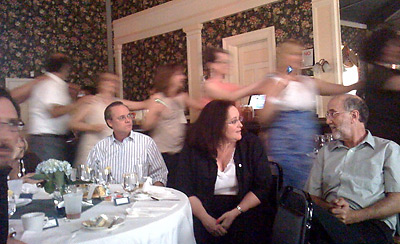A cousin’s bat mitzvah, and the tradition of defending our traditions by any means necessary
A family celebration leads Rochelle Terman, a Human Rights Center summer fellow, to ask this question: who decides what cultural practices are time-honored traditions worthy of preservation and which are 'barbaric' vestiges of the past?
July 23, 2010
COLUMBUS, OH — I went to my cousin’s bat mitzvah a couple weeks ago, a pretty typical one at that – lots of praying, lots of bagel and lox, and lots of distant relatives whom I’ve never met but seem to know everything about me.
 Each year the UC Berkeley-based Human Rights Center awards summer fellowships to students from University of California campuses, to enable them to work with human-rights organizations in the U.S. and abroad. Three current Human Rights Fellows have agreed to share their experiences this summer, with regular updates from the field to be published on the NewsCenter. Rochelle Terman sends her first post from Montreal.
Each year the UC Berkeley-based Human Rights Center awards summer fellowships to students from University of California campuses, to enable them to work with human-rights organizations in the U.S. and abroad. Three current Human Rights Fellows have agreed to share their experiences this summer, with regular updates from the field to be published on the NewsCenter. Rochelle Terman sends her first post from Montreal.
 Rochelle Terman
Rochelle Terman
on women living under Muslim laws
- Defending the rights of Muslim women is a highly charged minefield
- Violence against women in the name of ‘culture’ is pandemic
- How activism has brought me closer to my ‘Madar’ and my heritage
- A cousin’s bat mitzvah, and the tradition of defending our traditions by any means necessary
- A one-way path towards gender justice: The West leading the rest
- The aromas of Bali and the contours of a furious debate
- Reflections on a hijab-wearing Iranian feminist and how she touched my life
Pretty typical except for one thing. My cousin Mimi – the girl at the center of it all – is Chinese-American, adopted by my Jewish uncle and aunt and raised in rural Pennsylvania. Pretty sure that’s not what the Talmud had envisioned.
But if you sat in the synagogue pews, you wouldn’t know anything was off. You heard the same prayers, the same accented Hebrew, the same off-pitched singing.
Most people would say that events like this are important because they’re ‘part of tradition.’ But that begs a question: what’s so great about traditions?
I’ve come to believe that we value traditions like this one because they give us a sense of grounding. If you’ve ever been displaced or experienced major life change, you can appreciate the comfort that such traditions can offer. They give us a sense of an intimate relationship to ancestors and history, even when it seems like we’re living in an alien world where the only thing that matters is what’s new and different.
That’s why my cousin, who certainly doesn’t fit the mold of the ‘traditional’ Jew, can still feel a connection to the Terman ancestors – plus Moses, David, and Jacob – through her bat mitzvah ceremony.
At the same time, traditions are also guidelines for the future. They offer familiar signposts to break up the year. They give us a familiar script in our interaction with odd relatives, and remind us on a daily basis who we are and what the hell we’re supposed to be doing with our lives.
Considering how important traditions are, it’s no surprise that we defend them when they come under attack. Indeed, an attack on our traditions is akin to an attack on ourselves.
People are willing to die to protect their traditions. They’re willing to kill others for traditions. Why? It’s self-defense.
But traditions, rituals, and culture are never static. They’re constantly being reshaped and reinterpreted by our changing times. Some traditions die off, and new ones take their place. Some traditions are performed in entirely different ways. Some traditions take on radically new meanings.

A cousin's bat mitzvahn (Rochelle Terman photo)
So which traditions deserve to live on, and which ones don’t? What are we willing to do to defend our traditions? Are we willing to die? Are we willing to kill others?
These questions may seem very theoretical, except it has profound consequences for the reality of the world today.
When Israeli officials defend a blockade of Gaza or a deadly raid on a humanitarian flotilla, the language of ‘self-defense’ often extends beyond the defense of Israeli bodies, referring to the defense of ‘the Jewish people’— meaning, Jewish ‘culture’ and ‘history’.
When Fox News reports on the ground zero mosque controversy, they speak about the ‘Islamization of America’, reporting that construction of mosques is a tactic meant to ‘sneak in’ Islam to the root of the American cultural and legal tradition.
When Iranian women’s rights defenders participate in a peaceful demonstration demanding basic gender equality, they are arrested and charged, not with blasphemy or heresy, but ‘endangering national security‘. Challenging what the state calls ‘traditional gender roles’ is seen as an attack upon the nation itself.
But who decides what is ‘traditional’ – a time honored practice worth living on – and what is simply ‘barbaric’? More often than not, it’s the state, an interest group, or institutions of power that get to decide what should be considered traditional or authentic.
Furthermore, just because a practice is genuinely considered traditional, does that make it worth protecting? Think: racism, stoning, bigotry, and discrimination.
On the other hand, some national traditions, culture, and history are certainly worth saving. But how far are we willing to go? My cousin’s bat mitzvah was, at its core, about peace, tolerance, and understanding. If we defend an attack on this respected ritual by using violence, intolerance, and hatred, what do we lose in the process?
A lesson from the bat mitzvah:
“We cannot merely pray to You, O God, to end war;
For we know that You have made the world in a way
That we must find our own paths to peace
Within ourselves and with our neighbors.
We cannot merely pray to You, O God,
To end starvation;
For You have already given us the resources
With which to feed the entire world,
If we would only use them wisely.
We cannot merely pray to You, O God,
To root our prejudice;
For You have already given us the eyes
With which to see the good in others,
If we would only use them rightly.”
I invite you to email me at [email protected] and share your thoughts on these questions.
About Rochelle Terman

The daughter of a Muslim-Iranian mother and Jewish-American father, Rochelle Terman became interested in women’s rights in Iran while an undergraduate at the University of Chicago studying political science and Near Eastern studies. During that time, Terman did a summer internship at Women Living Under Muslim Laws — an international solidarity network for women whose lives are shaped by laws and customs said to derive from Islam — and helped to found the Global Campaign to Stop Killing and Stoning Women (SKSW).
Now a graduate student at Berkeley focusing on political science, Terman, 24, will spend the summer researching and documenting success stories of local women’s organizations located in seven countries — Afghanistan, Indonesia, Iran, Nigeria, Pakistan, Senegal and Sudan — as part of her continued work with SKSW.

